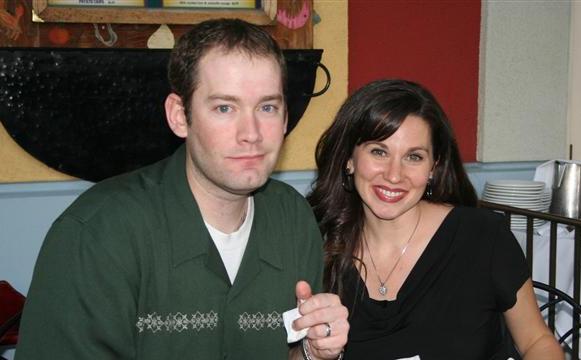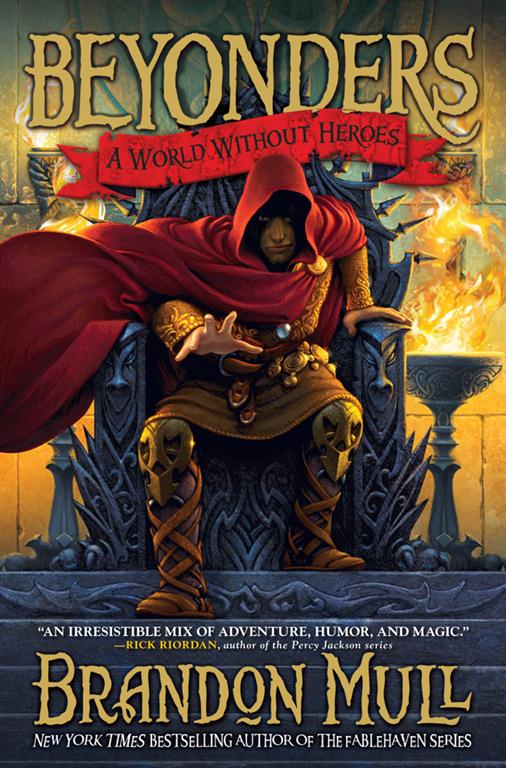 How did the story of the
Beyonders evolve? Did you have an image of the world first? One particular
character?
How did the story of the
Beyonders evolve? Did you have an image of the world first? One particular
character?
The book
that made me like fantasy in the first place was Narnia. The two things I liked
were: we leave our world to go somewhere magical and different, and you have
kid heroes. I always wanted to tell a story where we leave our world and go
somewhere else. No matter how we get to another world, whether it's a tornado
or a wardrobe, it's ridiculous. Let's embrace it. What's the most ridiculous
thing I could think of and still pull off? That's where the hippopotamus came
from. As I conceived of this idea of Maldor and a guy who was finding ways to
leave these heroes broken, the characters started to mean something to me. I
wanted the story to feel as authentic as I could, given that this is a fantasy
world.
Did you plan the entire arc of
the series in advance or one story at a time? Did you leave room for the plot
to take you in some unforeseen directions?
I'm a
big planner. I daydream about the story for a long, long time, and don't write
it until I see a really cool movie in my head. I finish book one and then go to
book two as soon as it's done. Before I wrote book two, I could have told
someone exactly what will happen in book three. The plus side is that I set up
some payoffs because I kind of know the trajectory that the characters are on.
That said, it's a flexible plan as I make discoveries that improve the story,
so some magic can happen as I write.
For Beyonders, you invent riffs
on the human species--displacers like Ferrin, seed people like Jasher. Where
did these ideas come from?
One of
the things I loved about Tolkien was that he took us to Middle Earth, perhaps
an ancient version of our own world, and had these very distinct races and made
them feel like they had their own societies. It was such a powerful illusion
that for years later, people took us to Tolkien's elsewhere. I wanted to create
races but didn't want to borrow from anywhere else. It's tricky to make a race,
because you want it to be different from what we've seen before, but you want
them to be relatable, where they feel human-ish. I haven't seen the seed man
thing before. The consequences of this characteristic are that they're wiser
and also more reckless because they are born over and over.
One of the main themes in the
book is, "Who is trustworthy?" Why is it important for Jason and
Rachel to be always slightly off-balance?
I have
always liked playing with the idea of who you can trust. In Fablehaven there's
the Society of the Evening Star that wants to steal artifacts from them. You
have some characters who seem great but who are actually spies. In Candy Shop War you have magicians giving
the kids candy that gives them magical powers, which seems great at first. But
then they have to do what the magicians ask of them. It's a very fun thing to
play with. It makes you engage with the characters and wonder and guess about
everyone's motives. In Beyonders, we
have this regime where the broken heroes--who might be good deep down--seem
weird on the outside, like Ned or the Blind King. Dangler [who helps Jason gain
an audience with Copernum], with his background, he's the one who's slowest to
trust. All those characters will figure into the rest of the story in fairly
important ways. One of the things we see happening in this book is the
convenient thing isn't always the best thing. Maldor is the master of
misdirection.
One of my favorite quotes comes
from Jasher: "For each of us, destiny is a blend of potential,
circumstances, and choices. You could flee and hide. You could bargain with
Maldor. You have chosen a heroic path. Walk it without apology." This
really gets at the heart of Jason and Rachel's journey. To what degree is that
your own belief?
That
quote is stating something I believe is true. You see guys who went astray in
different ways, and you have guys trying to get their self-respect back. You
can be a great warrior and be a jerk. It's the choices you make, what you stand
for, what you're willing to fight for. It's not a new question, but I thought
it was a new way to look at the question.
Much of the feast exploits the
worst of human failings. The lumba, or "hunger" berries, for
instance, about which Drake (another seed person) says, "No other food
tastes more divine.... But a person who regularly consumes the berries rarely
lasts long." Did you begin with the foible and follow it to its logical
end?
If you
look at the lumba berries, you can think of an alcoholic or someone hooked on
drugs. We can tackle real-world issues in novel ways in fantasy, and put a
little distance between the reader and the real-world issues, such as an
addictive substance that leaves you worse off than when you found it. I have
this hope that if you have conscientious characters facing tough choices, those
kinds of conversations will arise--regarding moral dilemmas, etc.
Same
with examining a world where heroes fall. If you look around our world, we have
fallen heroes: sports heroes, actors, politicians. Historically those have been
our heroes. In all those categories of people--if you're looking to them as
heroes--they keep letting us down. It's fun to talk about that kind of thing
without naming names, and in a way that doesn't feel personal or insulting.
Everyone on Earth screws up. There's always a chance at redemption for anyone.








 On your nightstand now:
On your nightstand now: With this first entry in his Beyonders series, Brandon Mull (the Fablehaven series) invents some details and plot twists that even devoted fantasy fans will not have seen before. A hero entering a passageway to an alternate universe is not new. But a teenager traveling through the digestive tract of a hippopotamus? That's new. Displacers who can have a head in one place and their limbs in another? Seed people who can replant the seed at the base of their necks and "resprout," with all of their former memories intact? These are just a few of the pleasures that await you.
With this first entry in his Beyonders series, Brandon Mull (the Fablehaven series) invents some details and plot twists that even devoted fantasy fans will not have seen before. A hero entering a passageway to an alternate universe is not new. But a teenager traveling through the digestive tract of a hippopotamus? That's new. Displacers who can have a head in one place and their limbs in another? Seed people who can replant the seed at the base of their necks and "resprout," with all of their former memories intact? These are just a few of the pleasures that await you.